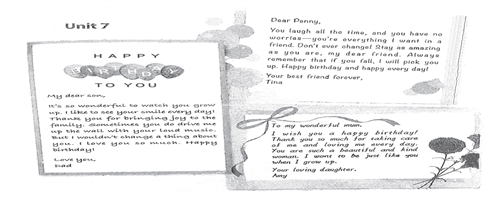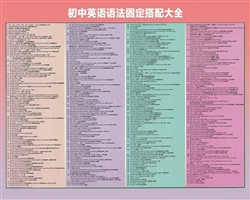基本句法掌握之后,接下来就要训练段落写作,这是因为段落是文章的基本组成部分,要写出好文章,必须在段落写作上多下功夫。段的基本组成是句子,好的段落应该是该段中所有的句子都围绕着一个主题展开,且句与句之间应该是紧密相连,形成统一的整体即unified and coherent。那么怎样将一个段落展开呢?下面介绍英语中几种常用的方法。
(一)时间顺序
按时间顺序写作就是按照事物发展在时间上的正常顺序或先后顺序展开段落。在讲述故事或回忆事件时,先发生的先写,后发生的后写。
【Example】My heart gave a leap when I heard the announcement that our train would soon arrive at its destination—Beijing. Like other passengers, I began to collect my things and put my mug, towel, atlas, apples, and other things into my bag. To the tune of a beautiful song the train pulled into the station and gently stopped by a platform. I walked out of the train and was carried forward by the stream of people into an underground passage and then into a big hall. As I stepped out of the station, I was dazzled by the bright autumn skies of Beijing. Though I had been on the train for more than thirty hours and spent a sleepless night, I didn’t feel tired at all, and I believed my days in this glorious city would be as sunny as the skies.
(二)空间顺序
按空间顺序组织材料通常用于描述一个地方、事情或人物外貌等。其文章内容应按照由近及远、由远及近、自下而上、自上而下、按顺时针方向或逆时针方向排列,
【Example】In the middle of the rectangular-shaped courtyard stood three magnolia trees(), all in full bloom. A little girl was hopping among them, now gazing at a bud, now collecting fallen petals. Under one of the trees stood her parents, who, while keeping an eye on her, were examining the snow white blossoms with great interest and admiration. In front of another tree a young couple, fresh and bright as the flowers, were posing for a picture. At the end of the courtyard a group of youngsters had gathered behind an artist painting a flourishing limb, which looked so charming and real that a boy stooped to sniff at a half-open flower. At the opposite end a few elderly men and women stood admiring the leafless flowering trees and the people looking at them.
(三)列举法
通过列举一系列的论据 对主题句中的论点进行广泛、全面的陈述或解释,列举的顺序可按照所列各点的内容的相对重要性、时间、空间来排列,
【Example】
The Other Side of City Life
In the eyes of many people, city life is attractive with all its advantages and convenience, yet they don’t see the other side of the picture. First, with the expansion of the city, housing has become a serious problem for city people. Then, there is the problem of pollution: harmful gases from vehicles and poisonous water from factories pollute our surroundings; noise continually disturbs your peace and rest and drives you mad. Thirdly, modern city life puts a high pressure upon people: you have to hurry to and from work; you have to dodge in so as to avoid bumping into the flood of people, bicycles, cars, buses… All day long you are under great stress. Fourthly, big cities also cause some social problems. Of which high crime rate is the most serious one. People are justifiably in fear of becoming victims of burglary, robbery, murder and other crimes at any time. They should find some ways to cope with all these problems.
(四)举例法
在主题句中简要、概括地说明一个段落的主题思想之后,可以用具体的、生动的事例来支撑论证主题,向目标读者展示并使他们具体感受主题句中尚未展开的内容和细节。【Example】This term several useful and interesting courses have been offered. An Introduction to European Culture, for instance, gives us a lot of background knowledge of the history of European philosophy, literature, and arts. From time to time we see slide shows of famous paintings and hear tapes of famous pieces of music, and they make the lectures all the more interesting. American Society and Culture is another course that attracts a large audience. The teacher, who visited the United States not long ago, discusses new trends and changes in American life as well as American history and traditions. We like these and other courses very much, because they help us not only to improve our English but also to broaden/widen our vision/horizon.
(五)比较和对比
比较(comparison)主要是指出两个或两个以上不同种类的事物的共同点或相似之处,如人物、地点、事物、思想、观点等。对照(contrast)主要是指出它们的不同点。相同的或类似的特征可以组成比较,不同的特征则可以组成对照。不仅如此,比较和对比常常同时使用,这是因为比较中往往隐含着对比。
比较和对比常有两种形式,即整体比较和对比(block/holistic comparison and contrast)与逐项比较(alternating comparison)。
【Example】Although Ulysses S. Grant and Robert E. Lee were fierce adversaries during the Civil War, their lives, both military and nonmilitary, has a great deal in common. Grant descended from a family whose members participated in the American Revolution. He received his commission of second lieutenant from West Point and served in the Spanish-American War. He was later summoned by President Lincoln to assume command of the Union Forces during the Civil War. After the Civil War, Grant suffered financial problems and was forced to declare bankruptcy. Lee also descended from a family which engaged in the American Revolution. He, too, received his commission from West Point and later fought in Mexico during the Spanish-American War. His fame as a military strategist during the Civil War, when he was the commander of the Confederate armies, is well known. Although it is not always pointed out by historians he, like Grant, had financial difficulties after the civil War and was compelled to declare bankruptcy. By securing a post as president of Washington College, he was able to avoid additional poverty.(整体比较)
The same qualities that make people good house guests make them good hospital patients. Good house guests can expect a reasonable amount of service and effort on their behalf, and hospital patients can also. Guests have to adjust to what is for them a change, and certainly hospital patients must do the same. No one appreciates a complaining, unpleasant, unappreciative house guest, and the hospital staff is no exception. Hose guests who expect vast changes to be made for their benefit are not popular for long. Certainly nurses and other personnel with their routines feel the same way about patients in their care. Just as house guests must make adjustments to enjoy their visits, so patients must make adjustments to make their stays reasonably pleasant and satisfying under the circumstances.(逐项比较)
(六)原因和结果
因果分析是常用的拓展段落的方法之一,一定要注意推理的逻辑性因果关系必须表达清楚,不能因果混淆,更不能因果倒置,要避免牵强附会和循环论证。一个原因可能造成一个或多个结果,也可能在一大段文章中涉及到一连串因果关系。一个结果也可能由多种原因所引起,通常先写结果,后写多种原因;但也可先写原因后写结果。另外,如果强调原因或结果,可用倒装或强调句型加以突出。
【Example】The surge of demand for oil will soon begin to send shock waves through the American economy and transportation system. The impact of these tremors can already be anticipated: to the consumer they signal the end of a long love affair with the car, and to Detroit they offer an early warning that its 1985 growth aims are dangerously unrealistic. Unless we exercise foresight and devise growth-limits policies for the auto industry, events will thrust us into a crisis that will lead to a substantial erosion of domestic oil supply as well as the independence it provides us with, and a level of petroleum imports that could cost as much as $20 to $30 billion per year. Moreover, we would still be depleting our remaining oil reserves at an unacceptable rate, and scrambling for petroleum substitutes, with enormous potential damage to the environment.
(七)定义法
有时候为了避免混淆或误解,我们必须对一个词、一条术语或谚语、一个概念通过下定义加以说明、解释。通常有三种方法下定定义:给出同义词、用一个带有定语从句的复合句或用一整段文章,而以第三种方法最为常用。1997年1月份四级考试的作文Practice Makes Perfect就是一篇极为典型的定义型文章。
【Example】A “liberated woman” is simply a woman who controls her own life, rather than allowing it to be controlled by other people, traditions, or expectations. A “liberated woman” can be found pursuing any line of work, including housework, or no work at all. She may or may not be married; she may or may not have borne children. She may belong to any race; she may have attained any age. She need have only one trait in common with her “liberated sisters”: she makes her own choices, whether they be the colors on her walls or the advanced degrees she seeks. She acts of her own volition, responsible to herself, and not out of fear of what her mother, lover, or neighbor might say.
(八)分类法
所谓“分类”就是根据人物和事物的特征将他们/它们分别归入各自不同的范畴。在写这一类段落时,一定要抓住各个类别的典型特征,不要异类相串,混淆起来。
【Example】According to Xiao Li, the fifteen students of his class fall into three groups. Seven of them work hard and study well. They always get good marks in examinations and are often praised by the teachers. Li calls them “good students”. The monitor, the secretary of the Youth League branch, and the captain of the class volleyball team, are quick in finding out what their fellow students are interested in or what they should do as a collective. They always organize proper activities at the proper time, so Li calls them “good organizers”. Four other students are very kind to their classmates, always ready to lend them a helping hand. They help to clean the classroom and the corridor even when they are not on duty. Li says that they are “good fellows”. “What about yourself?” someone asks him. “I’m a group by myself—a good observer.”





 。
。